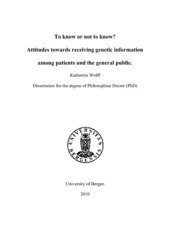| dc.contributor.author | Wolff, Katharina | |
| dc.date.accessioned | 2011-01-21T11:06:58Z | |
| dc.date.available | 2011-01-21T11:06:58Z | |
| dc.date.issued | 2010-11-16 | eng |
| dc.identifier.isbn | 978-82-308-1637-0 (print version) | eng |
| dc.identifier.uri | https://hdl.handle.net/1956/4449 | |
| dc.description.abstract | Progress in the field of molecular genetics has made it possible to identify individuals with an increased risk for a variety of hereditary diseases. To ensure successful implementation of genetic testing and counselling according to patients best interests the attitudes and motives behind testing intentions are important to consider. The main aim of the current thesis was to investigate factors which might facilitate the uptake of genetic testing. Furthermore this research investigated whether potential relatives want to be informed about the existence of hereditary conditions within their family, and under which conditions they want healthcare providers to breach confidentiality in order be informed. Finally, the thesis compares the attitudes of patients with hereditary conditions within their family to the attitudes of the general public concerning these issues. It was hypothesized that interest in receiving genetic risk information would be influenced by both characteristics of the individual and by characteristics of the disease. The role of disease characteristics was studied by using scenarios with systematically varied disease features, namely fatality, treatability and penetrance. Individual factors were investigated by using an extended version of Ajzen’s (1985; 1991) Theory of Planned Behaviour, as well as several individual difference measures such as uncertainty avoidance, worry, coping, self-efficacy, consideration for future consequences, knowledge about genetics, and familiarity with genetic testing. Results showed interest in learning about ones genetic risk to be relatively high, as was the acceptance of confidentiality breaches. Among the predictors the most important disease characteristic was the treatability of the disease, and the most important individual predictor was uncertainty avoidance. Patients were found to be more positive towards receiving genetic risk information and towards breaches of confidentiality then the general population. | en_US |
| dc.language.iso | eng | eng |
| dc.publisher | The University of Bergen | eng |
| dc.relation.haspart | Paper 1: Wolff, K.; Nordin, K.; Brun, W.; Berglund, G.; Kvale, G., 2010, Affective and cognitive attitudes, uncertainty avoidance and intention to obtain genetic testing: An extension of the Theory of Planned Behaviour. Full text not available in BORA. | eng |
| dc.relation.haspart | Paper 2: American Journal of Medical Genetics Part A 143A(2), Wolff, K.; Brun, W.; Kvale, G.; Nordin, K., Confidentiality versus duty to inform—An empirical study on attitudes towards the handling of genetic information, pp. 142–148. Copyright 2006 Wiley-Liss. Full text not available in BORA due to publisher restrictions. The published version is available at: <a href="http://dx.doi.org/10.1002/ajmg.a.31467" target="_blank">http://dx.doi.org/10.1002/ajmg.a.31467</a> | eng |
| dc.relation.haspart | Paper 3: Public Health Genomics 13(7/8), Wolff, K.; Brun, W.; Kvale, G.; Ehrencrona, H.; Soller, M.; Nordin, K., How to handle genetic information: A comparison of attitudes among patients and the general population, pp. 396-405. Copyright 2010 S. Karger. Full text not available in BORA due to publisher restrictions. The published version is available at: <a href="http://dx.doi.org/10.1159/000313458" target="_blank">http://dx.doi.org/10.1159/000313458</a> | eng |
| dc.title | To know or not to know? Attitudes towards receiving genetic information among patients and the general public. | eng |
| dc.type | Doctoral thesis | |
| dc.rights.holder | Copyright the author. All rights reserved | |
| dc.rights.holder | The author | eng |
| dc.subject.nsi | VDP::Samfunnsvitenskap: 200::Psykologi: 260 | nob |
